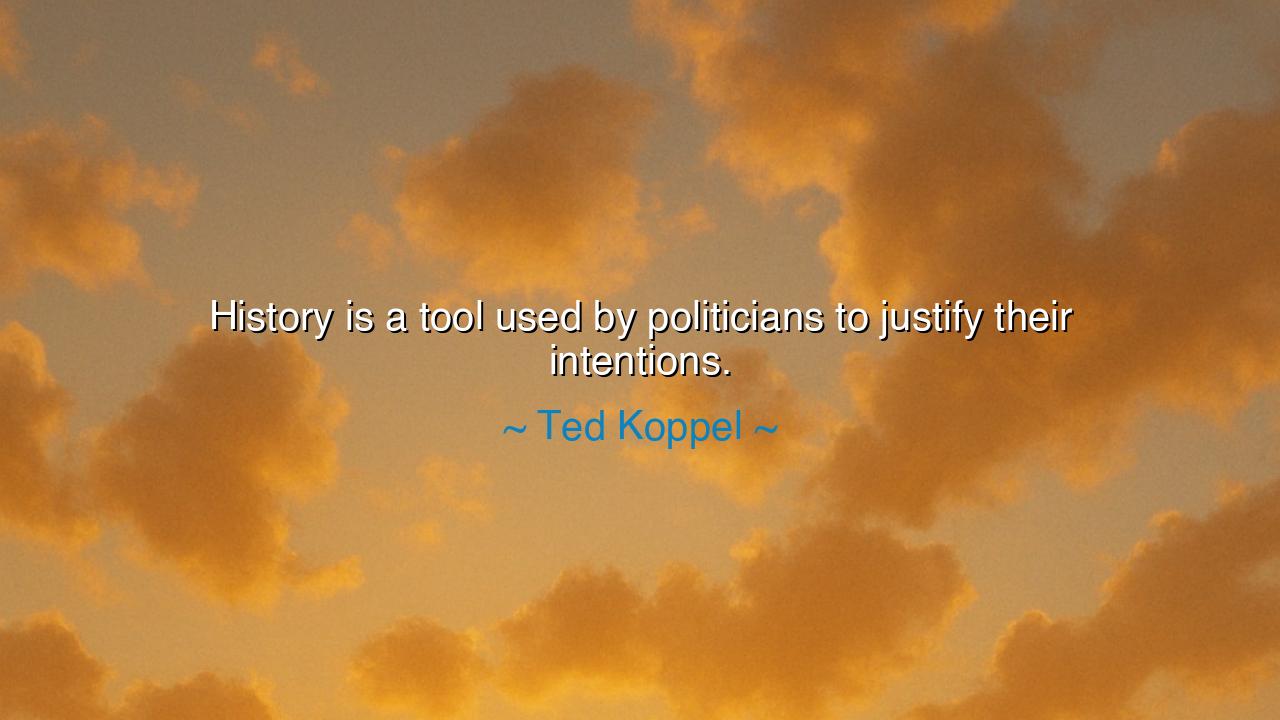
History is a tool used by politicians to justify their






The words of Ted Koppel, grave and discerning, pierce through the veils of time and power: “History is a tool used by politicians to justify their intentions.” In these words lies a truth both sorrowful and profound — that the story of mankind, written in ink and blood, is not always a record of what was, but often a reflection of what those in power wish it to be. For history, though born from the past, lives under the hand of the present. And when ambition grasps the pen, the truth is no longer history — it becomes narrative, sculpted to serve the will of rulers and the designs of states.
From the dawn of civilization, history has been the mirror in which men seek their identity. Yet the mirror can be tilted, and its reflection distorted. Kings, emperors, and ministers have all learned this craft: to take the chaos of memory and fashion it into a weapon. What greater instrument of persuasion than the past, sanctified by time and believed by multitudes? To command history is to command the soul of a people, for who controls the past shapes the meaning of the present — and thereby molds the destiny of the future.
Behold the example of Napoleon Bonaparte, who once declared that history is “a fable agreed upon.” In his empire, he clothed conquest in the garments of liberation, and painted his ambition as destiny. He was not the first, nor the last, to wield the chronicles of the past as justification for power. From the Caesars of Rome to the modern orators of our age, men have rewritten the scrolls of memory to sanctify their causes. Empires rise not merely by armies, but by stories — and it is the storyteller, not always the soldier, who secures the lasting victory.
Yet let us not condemn too hastily. For even the humblest citizen, the simplest nation, clings to a version of history that gives them meaning. Without a sense of purpose, societies falter. Thus, leaders understand that to sustain unity, they must forge a tale — a common origin, a noble struggle, a righteous cause. It is not the act of using history that corrupts, but the act of twisting it beyond recognition. The wise ruler invokes the past to illuminate the present; the cunning one manipulates it to obscure his motives.
We may look, for instance, to the Cold War, when both East and West drew upon their own retellings of history. Each side spoke of freedom, of justice, of destiny — yet beneath those banners lay ambition and fear. The world was divided not only by ideology but by narrative: each convinced that their story was truth incarnate. Ted Koppel, the journalist who chronicled those perilous years, saw clearly how politicians summoned the ghosts of history to march beside them — to inspire, to frighten, to justify. And in that realization, he left us a warning: that truth must never be surrendered to convenience.
The lesson is eternal: beware the history that flatters power. Question the tales told too smoothly, the heroes painted too perfectly, the villains too conveniently despised. The ancients said that truth is the daughter of time — but time alone cannot reveal her if men bury her beneath layers of rhetoric. Each generation must dig through the ruins of inherited stories to find the bones of reality. Only by doing so can we prevent the mistakes of the past from being repeated under new banners.
Therefore, my children of the future, do not accept history as it is handed to you — seek its heart. Read not only the victor’s chronicles, but the songs of the fallen. Listen to the silenced voices, the forgotten witnesses, the inconvenient truths. For when you know history as it truly was, not as it is told, you free yourself from manipulation. In that freedom lies the strength of a people, and in that strength, the hope of an honest world.
Let Koppel’s words echo in your mind: “History is a tool used by politicians to justify their intentions.” Remember them not with cynicism, but with vigilance. For history, in its purest form, is not a tool — it is a teacher. Guard it well, and it will guide you. Surrender it to ambition, and it will enslave you.






AAdministratorAdministrator
Welcome, honored guests. Please leave a comment, we will respond soon